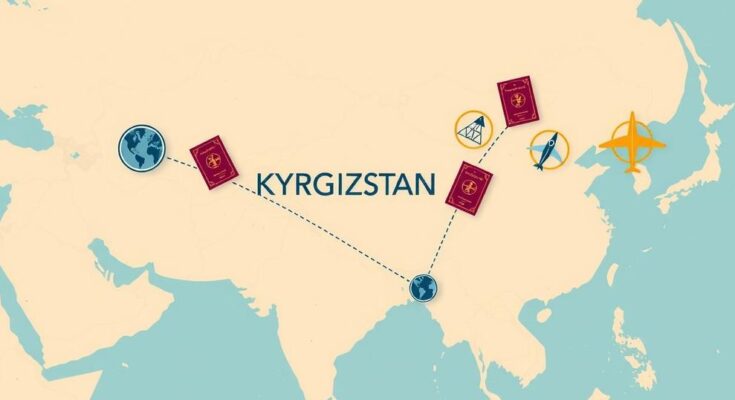Kyrgyzstan’s President Sadyr Japarov proposes a unified visa for Central Asian countries to facilitate travel and boost tourism. Modeled after the Schengen visa, it aims to strengthen regional cooperation. While past efforts like the ‘Silk Road Visa’ have failed, renewed discussions highlight the importance of overcoming challenges, especially concerning Turkmenistan’s entry policies. The initiative could significantly enhance connectivity if embraced by neighboring countries.
Kyrgyzstan’s President Sadyr Japarov has proposed an ambitious initiative to establish a unified visa system for several Central Asian nations, including Kazakhstan, Kyrgyzstan, Tajikistan, Turkmenistan, and Uzbekistan. This proposed system is modeled after the Schengen visa in Europe and aims to facilitate easier cross-border travel, enhance tourism, and foster regional cooperation. Japarov announced this proposal on social media, following a significant border agreement with Tajikistan’s President Emomali Rahmon.
The initiative, referred to as the ‘Silk Road Visa’, has been contemplated before, yet previous efforts have not succeeded. In 2018, Kazakhstan and Uzbekistan attempted to pursue a similar initiative, but it did not progress. Renewed discussions in 2020 were hindered by the COVID-19 pandemic and ongoing negotiations. As of 2022, Uzbekistan and Kazakhstan were still refining the legal framework for a regional visa system.
The timing of Japarov’s proposal is notable, as Central Asia emerges as a sought-after tourist destination due to its rich cultural heritage and stunning landscapes. However, implementing a unified visa poses several challenges, particularly aligning immigration policies and ensuring border security. The European Schengen Zone’s experience serves as a reminder of the complexities associated with managing borders and migration flows, which Central Asia must consider.
Turkmenistan poses a significant hurdle due to its stringent entry regulations and limited engagement in regional collaborations. The country’s stance on the proposed unified visa initiative remains ambiguous, which could greatly impact its success.
In addition to simplifying travel, Japarov views the proposed visa system as a pathway to enduring regional stability, referencing the resolution of longstanding border conflicts, particularly between Kyrgyzstan and Tajikistan. He remarked, “Now we can say that all countries in the region have finally resolved their border disputes. From this moment, eternal peace was established in Central Asia.”
While the proposal is still in the preliminary stages, the responses from regional leaders will ultimately determine its viability. Should it come to fruition, the unified visa could significantly enhance connectivity in Central Asia, fostering a more integrated and accessible region.
In summary, Kyrgyzstan’s proposal for a unified visa system in Central Asia signifies a crucial step toward promoting tourism and enhancing regional cooperation among its neighboring countries. Despite historical challenges and political hurdles, particularly with Turkmenistan’s participation, the initiative aims to resolve longstanding border disputes and facilitate easier cross-border travel. If successful, it has the potential to transform Central Asia into a more interconnected region.
Original Source: www.ndtvprofit.com




